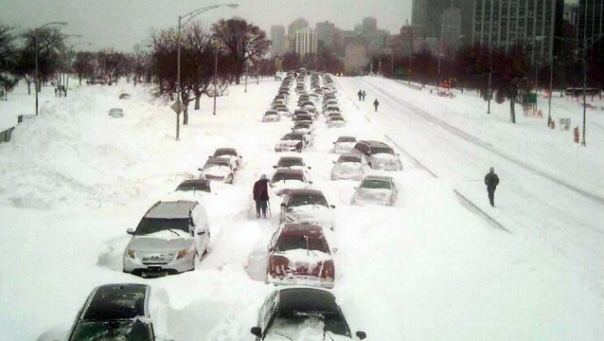The Union of Concerned Scientists, a group I greatly admire, has held a press conference (with attendant media coverage) to air an argument that is already quite intuitive to me, but is probably precisely the opposite for others: Namely, that global warming could mean more mega-snowstorms, of the sort North America has seen in the past several years.
On a physical level, the case is sublimely simple. One of the fundamental aspects of global warming is that it increases the amount of moisture in the atmosphere, because warmer air holds more water vapor. From there, it’s a piece of cake—more snow can fall in snowstorms than before. In making this case, the UCS drew in part on the awesome weather blogger Jeff Masters:
“The old adage, ‘It’s too cold to snow,’ has some truth to it,” said Masters. “A colder atmosphere holds less moisture, limiting the snowfall that can occur.” He cited a study that found that a high percentage—as much as 80 percent—of all snowstorms in the United States of more than 6 inches during the 20th century occurred during winters with above average temperatures.
“If the climate continues to warm,” he added, “we should expect an increase in heavy snow events for a few decades, until the climate grows so warm that we pass the point where it’s too warm for it to snow heavily.”
So the science makes sense–but on a psychological level, it seems to me that getting people to accept this most counter-intuitive of analyses is likely to be one of the biggest sticking points of all. Why’s that?
Well, first, people confuse climate and weather endlessly. We already know that. But that’s just the beginning of the problem.
Psychologists studying climate communication make two additional (and related) points about why the warming-snow link is going to be exceedingly difficult for much of the public to accept: 1) people’s confirmation biases lead them to pay skewed attention to weather events, in such a way as to confirm their preexisting beliefs about climate change (see p. 4 of this report
“Perceptions of the implications of lots of snow for the existence of climate change are like the results from a Rorschach test,” writes Janet Swim, a psychologist at Penn State who headed up an American Psychological Association task force report on psychology and climate change.
Suggesting that he knows this well, Marc Morano is already blasting Jeff Masters and the Union of Concerned Scientists over the global warming-snow claim. Clearly, Morano feels he’s on strong ground here, tactically or otherwise.
I feel torn about this. On the one hand, winter snowstorms have drawn massive attention and have affected incredibly large numbers of people. They speak to everyone’s experience. Tying global warming to that would be incredibly powerful.
But at the same time, the hurdles presented are incredibly vast, and I’m not sure good scientific explanations, alone, can overcome them.
That doesn’t mean the UCS and Jeff Masters should leave this topic alone. Many people are open minded and want to know what’s going on with the climate system; and for the rest of the public, over time we may push them closer to a point where these ideas will go down more easily.
And that’s the ultimate takeaway: We need to move the public to a place where drawing a warming-snowstorm connection isn’t so challenging. I don’t think drawing the connection itself will get us there. Rather, I think other efforts, over time, will make people more willing to draw the connection.
Subscribe to our newsletter
Stay up to date with DeSmog news and alerts






